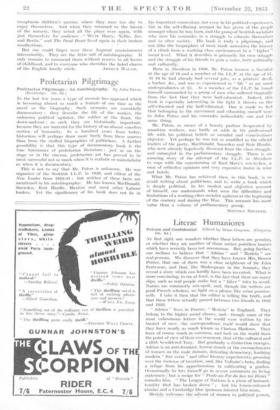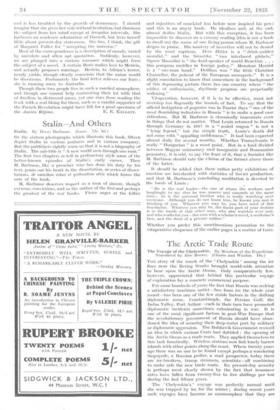Literae Humaniores
Private and Confidential. Edited by Brian Grayson. (Grayson. 10s. ad.) AT first sight one wonders whether these letters are genuine, or whether they are another of those rather pOintless, hoaxes which have recently been not uncommon. But, going further, one inclines to believe that " Adrian " and " Merl*. " are real persons. We discover that they have known Mrs. Brown Potter, that one of them was a close neighbour of Sir John Fortescue, and that, like Shakespeare in the Sonnets, they reveal a story which can hardly have been invented. What is more convincing, to me at least, is the fact that there are many slips, such as real people make but a " faker " tries to avoid. Names are constantly mis-spelt, and, though the writers are good French scholars, we light on a phrase like crime 'passion- mile. I take it then that the editor is telling the truth, and that these letters actually passed between two friends in 1939 and 1933.
" Adrian " lives in France, " Mericia" in England. They belong to the higher social classes, aoc17-though some of the most voluminous letters in the world were written by the busiest of meril---the correspondence itself would show that' they haVe nearly as much leisure as Clarissa Harlowe. They have of course much in common, and look on the world from the point of view of their environment, that of the cultured and a little bewildered Tory. But gradually a distinction emerges. Adrian is an anti-feminist, horror-struck at the encroachments of Women on the male domain, detesting democracy, loathing modern " free verse " and other literary experiments, groaning over the increase of.taxation, and, like Voltaire's hero, finding a refuge from his apprehensions in cultivating a garden. Occasionally he lets himself go in severe comments on living statesmen ; but a recipe for " Poule-au-Pot du bon roi Henri" consoles him. "The League of Nations is a piece of humani- tomtity that has broken down " ; but his lemon-coloured zinnias and a Cambridge, blue ipomoea interest him more.
Mericiit sycleamc the advent of women to political power, and is less troubled by the growth of democracy. I should imagine that she gives her vote without hesitation, but dismisses th subject from her mind except at irregular intervals. She harbours an academie admiration of Disraeli, but frets herself little about present-day statesmen. She has, I think, the gift of Margaret Fuller for " accepting the universe."
Most of the correspondence is a description of moods" , varied by anecdote and often apt quotation. Suddenly, however, we are plunged into a curious romance which might form the subject of a novel. A certain•Botis makes love to MeriCia; and actually proposes marriage. Mericia, to Adrian's terror, nearly yields, though clearly conscious that the union would be disastrous. Fortunately the final letter relieves our fears : she is running away to Australia.
Though these two people live in such a rarefied atmosphere, and though one cannot help contrasting -their lot with that of dwellers in distressed areas, yet one rises from reading the book with a real liking for them, such as a candid supporter of the French Revolution might have felt for a good specimen of































































































 Previous page
Previous page